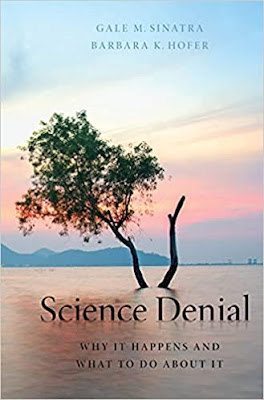Gale Sinatra, PhD, & Barbara Hofer, PhD
On hot-button topics such as climate change, vaccines and genetically modified foods, science denial is rampant – and it crosses party and ideological lines. What are the psychological forces that lead people to disbelieve scientific consensus? Is science denial worse than it’s ever been? How have the internet and social media changed the landscape of science skepticism? Psychologists Barbara Hofer of Middlebury College and Gale Sinatra of the University of Southern California, authors of the book “Science Denial: Why it Happens and What to Do About it,” discuss these and other questions.Goes to this book, which I've previously cited.
8: What Can We Do About Science Denial, Doubt, and Resistance?The authors enumerate a range of tactics stratified by and targeted toward the breadth of "stakeholders" and audiences. A fine read.
Science denial, doubt, and resistance are pervasive and troubling. Numerous surveys show a large discrepancy between what the public accepts as scientifically valid and what scientists accept. Whether the topic is evolution, global warming, or genetically modified organisms, US citizens seem to have a poor awareness of what scientists know, as well as scientists’ level of certainty about knowledge on such key issues.
A refusal or reluctance to accept settled science can impede solutions for many of the problems that face modern society—notably, serious threats of human-caused warming of Earth’s climate and global pandemics. The goal of this book has been to provide the social and cultural context of science denial and the psychological explanations that underlie susceptibility to it. Improving the public understanding, acceptance, and valuing of science can move us all toward saving the planet and improving the health and wellness of all lives and communities...
Sinatra, Gale; Hofer, Barbara. Science Denial (p. 161). Oxford University Press. Kindle Edition.
From a piece I saw on Rawstory.com:
"You don't have to go any further than acknowledging the politicization of a pandemic in which more Americans have died than during the 1918 flu pandemic, when medical science was a pale shadow of what it is now, to understand how far from normal things are.
If anything, we are beyond a constitutional crisis. It is now a crisis of survival. Can humanity survive when so many people deny scientific facts, and the world is literally on fire and drowning at the same time? The stakes could not be higher. A recent study from the journal Science reported that if you're under 40, you can expect an "unprecedented" life of extreme heat waves, droughts and floods. You will live through seven times as many heat waves, twice as many wildfires and nearly three times as many droughts, crop failures and river floods as your grandparents. Never mind the pandemic."
We are out of time for science denial and disinformation. We need logic, facts, and evidence.
apropos,
"The Better Arguments Project is a national civic initiative created to help bridge divides – not by papering over those divides but by helping people have Better Arguments. In this sense, arguments don’t have to drive us apart. Better Arguments can bring us together. In partnership with communities and advisers around the country, we have synthesized three dimensions and five principles of a Better Argument."
I participated in a Zoom webinar of theirs today. It was very nice, very well-attended. More on them shortly. Their "method" makes intuitive sense.
Goes to my interest in "Deliberation Science" and "#SciComm."
I was blessed to get to teach critical thinking and argument analysis at UNLV for a number of years as part of the evening adjunct faculty (I was a risk analyst in a credit card bank at the time). I would always posit a rhetorical question to my students “what if your logic, your facts, and your evidence are all rock-solid, but you fail to persuade others of your case? What have you truly accomplished?”From "YouTube Bans Anti-Vax Videos"
Notwithstanding that admonition, the overall thrust of my teaching (to the required text) was necessarily more like “OK, here’s how all this stuff works. Take it or leave it. I hope you take it to heart (persuasiveness), but it’s up to you.“
That does not suffice.
…How do we live with social media without it destroying democracy, public discourse, and public health? I think banning demonstrable misinformation is a reasonable measure. But we can also have a conversation about how best to do this. Perhaps we need public independent panels, including experts, scholars, and public representatives, to make such decisions, with a relatively high bar for what counts as demonstrable misinformation. Decisions should be transparent and reviewable. There are things that we can collectively agree upon, and in specific cases we may need to limit the right not to disagree with reality, but to publicly spread that disagreement along with facts [sic] that are demonstrably wrong.
ON WOMEN
It occurs to me—particularly in light of recent Afghan events—that more than half of the compelling authors I've cited here across the past month and a half are women. Scrolling back through the 500-some titles in my Kindle stash indicates a similar proportion long-term. Never really gave it any thought before. Cogency is cogency, period.
From Twitter messaging with one of my authors recently:
apropos of my [prior] post regarding “behavior genomics.“ I was just struck by how many of my many recent book readings are by women. More than half. I think sadly about the women and girls in Afghanistan now. The Taliban are shooting themselves in the ass. Women are every bit the cognitive equals of men. I would say to Afghan women “come here to the US, where you can get educated and contribute significantly.”
I take a back seat to no one when it comes to recognition of and support for womens' autonomy and equality. You can ask my scary smart wife of more than 40 years.
UPDATE: FROM A WAPO OPED
_________





No comments:
Post a Comment